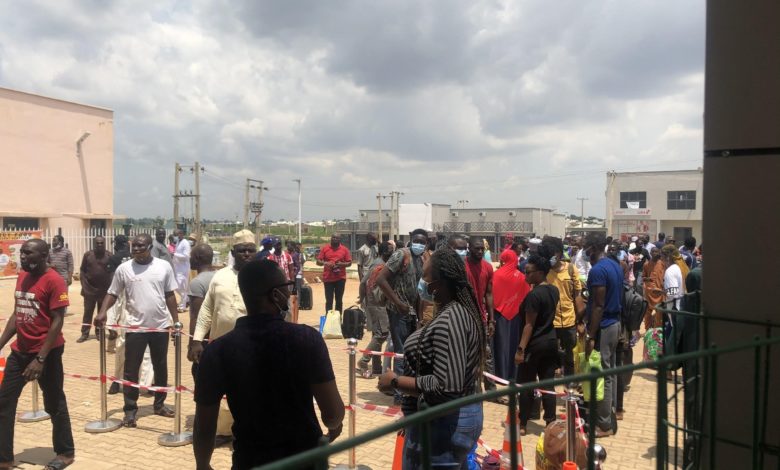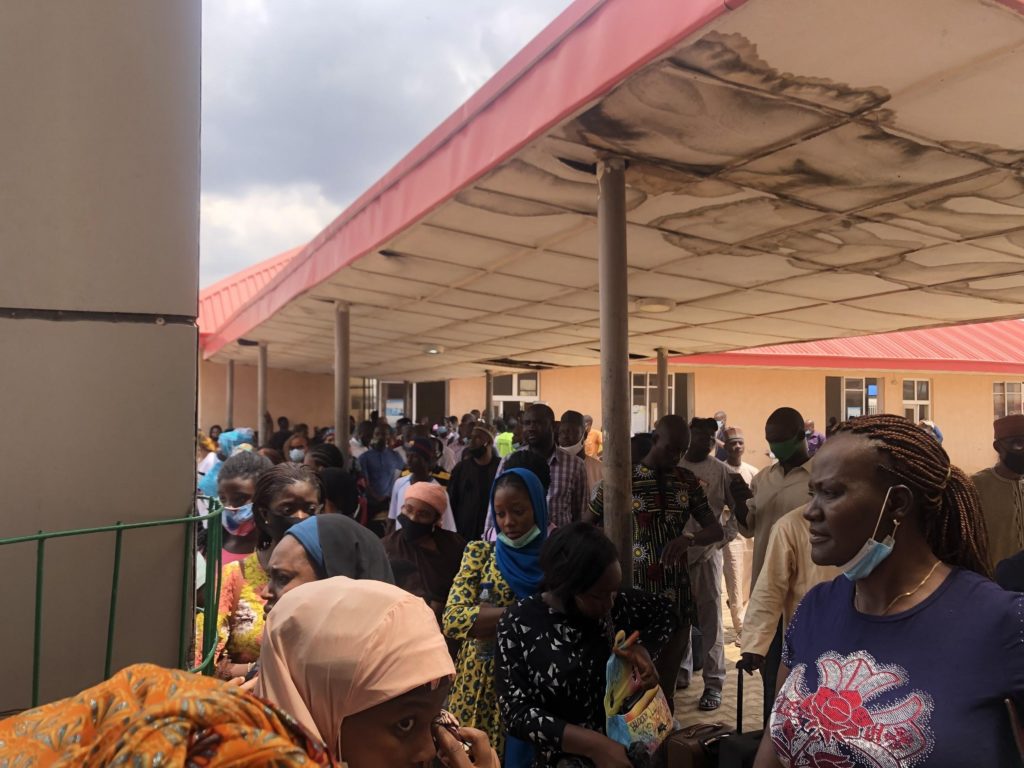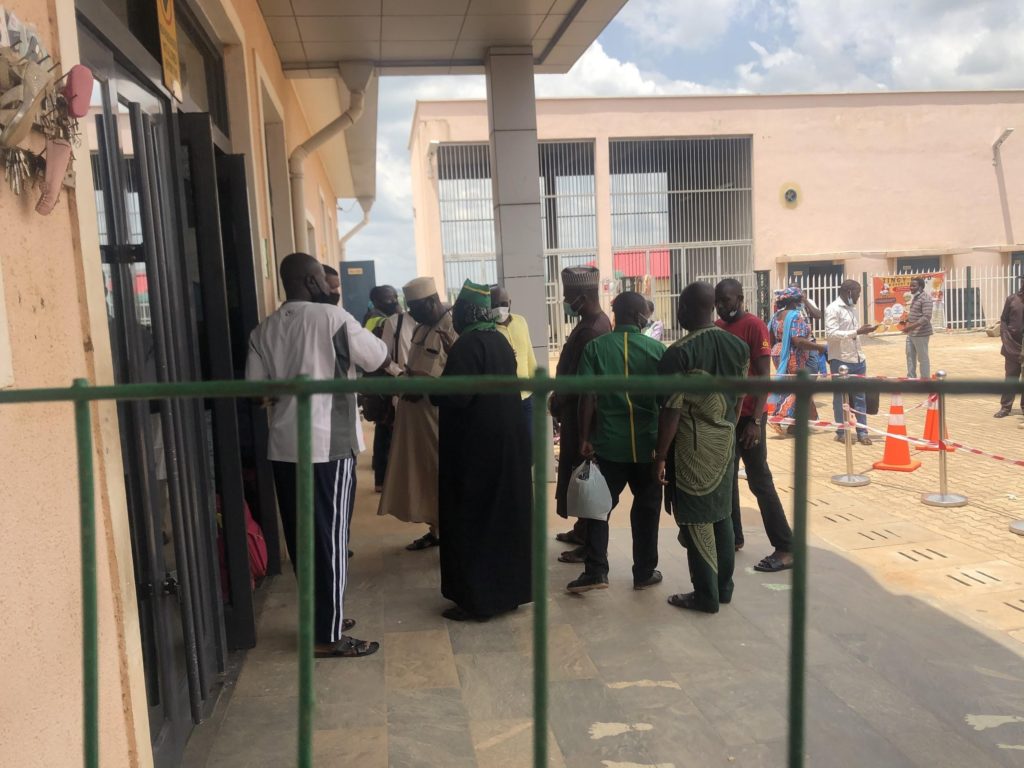Unsafe Abuja-Kaduna Highway Vs Corrupt Rail Officials — Commuters Forced To Pick

Wednesday, September 9: Abuja was tense, under the grip of some sinister foreboding. There had been intelligence information about terrorists active cells all around and within the Federal Capital Territory. Naturally, residents were on the edge, troubled and anxious.
Experts familiar with the activities of terrorists estimate that hundreds of them are in their enclaves getting ready to strike at prime targets. The terrorists minds work diligently on ways to blow up malls, bomb hotels and destroy prime targets with towns, maim people, rape women and do all that sort of criminalities.
The grim picture is further compounded by indications that terrorists returned to the Abuja-Kaduna highway with full force. In their most recent operations they blocked the highway, killed a “luxurious” bus driver and kidnapped a handful of passengers on the evening of Wednesday.
The previous week there were reports, not corroborated by the Police though, that terrorists had kidnapped several people on the noon of Friday, September 4, 2020.
“My driver called and told me what happened at around 5:00 p.m after he dropped me at Zuba and went back to Kaduna,” a close friend who followed the deadly turn of events on the highway confided.
“The kidnappers blocked the road and many drivers had to stop for hours till after they finished their operations,” he added.
Here was I in Abuja, with an urgent need to attend to a crucial issue in Kano. I was already drained by the dreadful news in the public domain. The stories of escalating terror operations in the city and on the highway gave me sleepless nights.
Putting my car on the road for the drive to Kano, something that had become a routine for me, was now out of any contemplation. I was awake all night and even if driving through the dreadful highway were an option, I could not muster the strength to do it.
The same morning there was more terrifying news. Gunmen had attacked Tungar Maje village within the Gwagwalada area, abducting six people after a clash with police and vigilante officers! My heart was beating fast.
A friend advised me to take a train ride to Kaduna and complete the rest of the journey on the road. I heeded and headed to the Kubuwa train station. I started from Kubwa Station on the morning train, after a few minutes of “African time”. There were many and different passengers: men, women and children.
The passengers appeared relaxed. No traces of anxieties, evidently trusting on the safety record the train journey has recorded over time. It is a distinct contrast from the constant foreboding of horror when travelling by road.
Days later, specifically on September 14, passengers on the train ride between Kaduna and Abuja were treated with the unexpected. The Kaduna-Abuja train had been attacked. Some people claimed it was terrorists who shot bullets on the train, but officials claim it was villagers who threw stones at the train.
For instance, Prof. Jibrin Ibrahim, in alarm tweeted “Apparently, a group of young men have been attacking the Abuja-Kaduna train with stones, the main option for those who abandoned the road, due to fear of kidnapping. Gradually, we will all be too terrified to travel in the country, keywords – FEAR, ANGER, FRUSTRATION.”
Apparently, a group of young men have been attacking the Abuja-Kaduna train with stones, the main option for those who abandoned the road, due to fear of kidnapping. Gradually, we will all be too terrified to travel in the country, kew words – FEAR, ANGER, FRUSTRATION
— Jibrin Ibrahim (@JibrinIbrahim17) September 15, 2020
My experience on the first leg of the journey at the ticketing office was refreshing. Passengers were orderly and ticketing officials were responsive. However, I noticed a few “big men” meeting the railway staff at the backyard, handing them some papers that looked like money and collecting what looked like tickets in return.
It was two hours of safe, steady and hitch-free journey with few necessary stops at different train stations. I didn’t experience any difficulty till after I was returning and decided to board the Kaduna-Abuja train from Rigasa station.
Although it rained heavily in Kano, I woke up very early, took a car and moved to Kaduna to board the second morning train. I needed to be in office for a meeting. My editor-in-chief said he needed to discuss an important issue with me.
Lots of diversions and numberless potholes on the Kano-Zaria road extended my three-hour journey to about four hours. I was at the Rigasa Station before 10:00 a.m, but I was told the tickets have been sold out. I decided to take the 2:00 p.m scheduled train.
I sat down under one dilapidated roof close to one gentleman who was lamenting on the issues of insecurity in the country. “If not because they couldn’t secure us why would someone come here to waste his time after they doubled the ticket fare?”.
I looked at him with a fake smile. Even though I appeared cool outside, I was burning for this country inside. As a journalist reporting insecurity, I come across what devastates me everyday. I believe the gentleman knows just a tip of the iceberg.
My first experience on the Abuja-Kaduna train apparently gave me a false sense of modest expectation of civilized conducts by officials at the train station. I was now seeing a well entrenched nightmare of selling tickets at Rigasa train station.
We formed a new queue and waited till 12:30 p.m when the next scheduled train ticket sales would resume. There were two different queues, one for men and other for ladies. There are different queues for males and females. The queue for males was nearly twice as long as that of ladies’. But both queues were very long. Social distancing was never recognised and I didn’t see anybody washing his hands although many people wore face masks.
There were few skirmishes on the queue with few trying to jump it and others trying to buy more than one ticket at a time. Some ticket buyers were skipped because they didn’t hold “their change”. I could hear the ticket sellers shouting “hold your change”. A Nigerian conductors’ euphemism for “we will not waste our time on you”.
I was counting N2,600 out of my money to ensure I would not be skipped when I saw one woman with long black Abaya and the Nigerian Railway Corporations (NRC) cap peeping through her eyeglasses and telling the ticket sellers what others couldn’t hear in a very low tone. She was telling them to stop selling the tickets!
Many people initially assumed that she was there to restore order among the weary passengers who had become unruly and rendered the queues disorganised. No one thought any individual could claim that tickets were sold out after less than 30 buyers. It was later I learnt the Rigasa station is the centre of ticket racketeering.
Immediately the woman left, the sellers told us the tickets were sold out. I still recall vividly the gloomy faces of the dumbfounded passengers. Others started thinking to use their wits, ways and reputations to get the tickets. I could see some people getting it from some people who looked like the staff of the NRC at higher cost.
A youngman standing close to me said he was waiting to see what would happen to other seats in the train since, according to him, it is not possible to take less than 30 people in a train that could accommodate more than 300. The poor guy didn’t know how the business was done.
At around 1:50pm the passengers were called to board the train. People started trooping from nowhere. I could see the staff of NRC carrying bags for “big people” to the train. Others were telling the police officers there to allow “these three people to pass, I have their tickets”.
It was at that moment that something came to my mind. My knowledge of Information Technology, which is what I studied at university, started asking why tickets couldn’t be sold online? Why a website, if not a mobile application, can not be created to ease buying the tickets? Then I remembered we are in Nigeria where even the simplest of routines is rendered mysterious.
Matthew Page tweeted about this thus: “I am not quite sure that Nigeria has a business model that underpins its rail infrastructure investments. After investing millions in refurbishing railways, an anarchic approach to ticket sales and sparse schedules will make rail travel unviable.”
COVID restrictions aside, I am not quite sure that Nigeria has a business model that underpins its rail infrastructure investments. After investing millions in refurbishing railways, an anarchic approach to ticket sales and sparse schedules will make rail travel unviable. https://t.co/aiw2xdrj4Y
— Matthew T. Page (@MatthewTPage) September 15, 2020
In 2019, the Managing Director of the NRC, Mr. Fidet Okhiria, told journalists in Abuja that the e-ticket process was at its final stage.
He said, “The e-ticketing has gone to an advanced stage, the process is on. We are just at the final stage of getting the necessary approval for them to be deployed.
“It has passed through Independent Corrupt Practices and Other Related Offences Commission (ICPC) and the Bureau of Public Enterprise (BPE).
We hope very soon it will kick-off. I can’t give the time exactly when it will start but the Federal Executive Council (FEC) will decide.”
About a year now and a website that I can build in one week, if not in a few days, is yet to pass it’s final stage!
Support Our Journalism
There are millions of ordinary people affected by conflict in Africa whose stories are missing in the mainstream media. HumAngle is determined to tell those challenging and under-reported stories, hoping that the people impacted by these conflicts will find the safety and security they deserve.
To ensure that we continue to provide public service coverage, we have a small favour to ask you. We want you to be part of our journalistic endeavour by contributing a token to us.
Your donation will further promote a robust, free, and independent media.
Donate HereStay Closer To The Stories That Matter







Are the rail officials this corrupt that all these things are happening? Is there no one to look into this matter? Is this how unsafe and insecure the Kaduna-Abuja highway has become with all the kidnappings and several killings? Is this how we will be too scared and terrified to travel by rail or road in which the last option will then be by air? Lets be realistic, how about those who cant afford to travel by air due to its expensive nature, will they then risk their lives or decide to not travel at all? All these thoughts keep invading our minds leaving us in a state of doubt and wonder. This has to have an ending and a solution though. We all hope that one day this disastrous situation will have a chapter to close, an end of discussion and history.